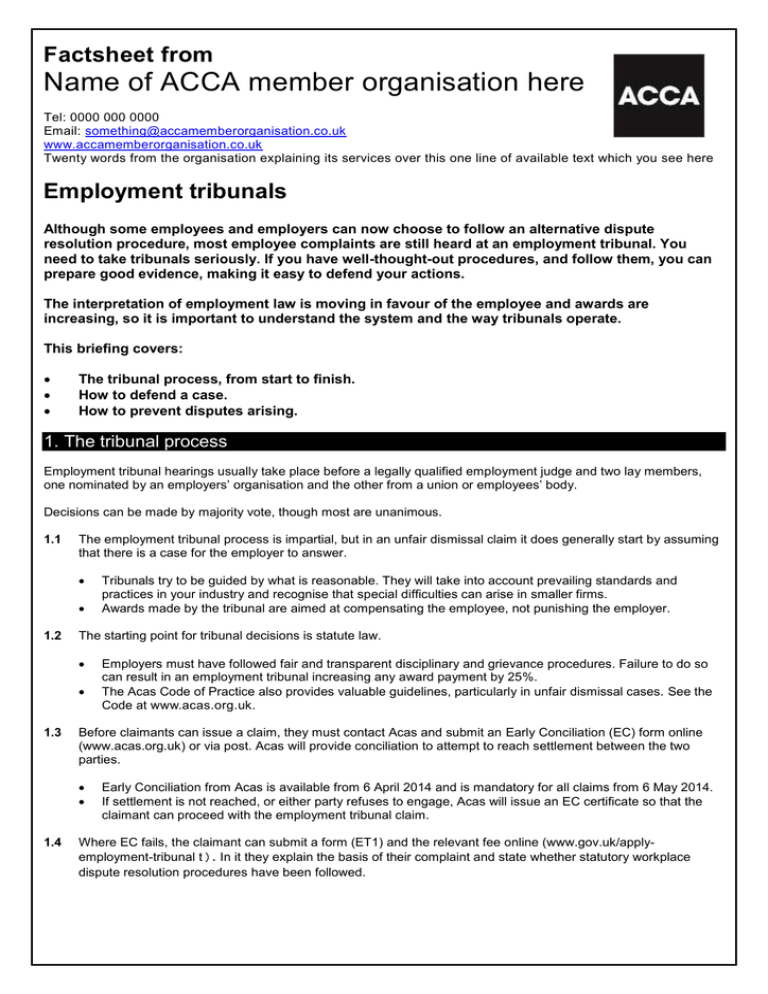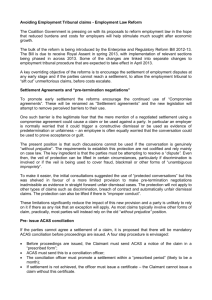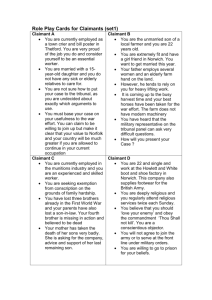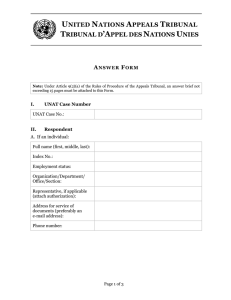
Factsheet from
Name of ACCA member organisation here
Tel: 0000 000 0000
Email: something@accamemberorganisation.co.uk
www.accamemberorganisation.co.uk
Twenty words from the organisation explaining its services over this one line of available text which you see here
Employment tribunals
Although some employees and employers can now choose to follow an alternative dispute
resolution procedure, most employee complaints are still heard at an employment tribunal. You
need to take tribunals seriously. If you have well-thought-out procedures, and follow them, you can
prepare good evidence, making it easy to defend your actions.
The interpretation of employment law is moving in favour of the employee and awards are
increasing, so it is important to understand the system and the way tribunals operate.
This briefing covers:
The tribunal process, from start to finish.
How to defend a case.
How to prevent disputes arising.
1. The tribunal process
Employment tribunal hearings usually take place before a legally qualified employment judge and two lay members,
one nominated by an employers’ organisation and the other from a union or employees’ body.
Decisions can be made by majority vote, though most are unanimous.
1.1
The employment tribunal process is impartial, but in an unfair dismissal claim it does generally start by assuming
that there is a case for the employer to answer.
1.2
The starting point for tribunal decisions is statute law.
1.3
Employers must have followed fair and transparent disciplinary and grievance procedures. Failure to do so
can result in an employment tribunal increasing any award payment by 25%.
The Acas Code of Practice also provides valuable guidelines, particularly in unfair dismissal cases. See the
Code at www.acas.org.uk.
Before claimants can issue a claim, they must contact Acas and submit an Early Conciliation (EC) form online
(www.acas.org.uk) or via post. Acas will provide conciliation to attempt to reach settlement between the two
parties.
1.4
Tribunals try to be guided by what is reasonable. They will take into account prevailing standards and
practices in your industry and recognise that special difficulties can arise in smaller firms.
Awards made by the tribunal are aimed at compensating the employee, not punishing the employer.
Early Conciliation from Acas is available from 6 April 2014 and is mandatory for all claims from 6 May 2014.
If settlement is not reached, or either party refuses to engage, Acas will issue an EC certificate so that the
claimant can proceed with the employment tribunal claim.
Where EC fails, the claimant can submit a form (ET1) and the relevant fee online (www.gov.uk/applyemployment-tribunal t). In it they explain the basis of their complaint and state whether statutory workplace
dispute resolution procedures have been followed.
1.5
You will be sent a copy and must respond (on form ET3) within 28 days of the date the form was sent out, or
risk losing your right to contest the case ( www.justice.gov.uk/forms/hmcts/employment).
What you say in your response is the case you will be putting to the tribunal, so give a considered reply.
If you have a good reason, you can ask for an extension beyond the 28-day period.
You will be sent a date for the hearing.
Any request for a postponement should ideally be made immediately.
If a date is just impossible for you, tell the tribunal, giving good reasons. (If you will be abroad, send a copy of
your air ticket.)
When you reply, tell the tribunal if you think the case is likely to be complicated.
2. Before the hearing
When an application is made against you, it is the preparation you do before the hearing that is most likely to determine
the outcome.
2.1
Check first to see whether the application is technically flawed.
For example, in unfair dismissal cases, the claimant must have two years’ service (one year if employment
commenced before 6 April 2012), except where discrimination or other automatically unfair reasons for
dismissal are involved.
The claim must be made within three months of the date of termination — except where the claimant thinks
the matter is being dealt with internally, or in rare cases, at the tribunal's discretion.
If the claim is invalid on technical grounds, write to the tribunal. Ask for a pre-hearing review to get the claim
thrown out.
2.2
Investigate the issue again, to make sure of your ground before getting into a fight.
2.3
Resolve the claim amicably or settle (see 6) if it arose from a genuine misunderstanding.
2.4
For example, explain the reasons why an expected promotion was not given.
If you think the claim is almost certain to fail, request a pre-hearing review.
2.5
The manager responsible may have been misleading you.
The tribunal will look at relevant documents.
If you go ahead to a hearing, be clear about the costs and benefits of fighting the case.
Even a fairly straightforward case can drag on for months.
The cost in disruption and management time can be considerable. A case can also damage the credibility of
your business.
Some cases are worth defending to signal your resolve to other employees.
2.6
Prepare a realistic case strategy, based on your strengths.
2.7
Prepare evidence to show the background to the case and to prove what happened.
2.8
General evidence provides the background — contracts of employment, employee handbooks and your HR
policy statements.
Specific evidence relates to the case itself.
As part of your preparation for the hearing, you can seek further particulars of the claim from the other side.
For example, are there any further allegations that will be made against you?
2
If you need more information, ask for it.
If it is not handed over, write to the tribunal to make your request, compelling the claimant to give you the
information.
You must respond reasonably to requests for information from the other side.
If you are on the receiving end of a request that you think is silly or goes too far, ask the tribunal to vary it.
2.9
You will usually need to exchange documents in advance of the hearing.
You must prepare witness statements beforehand (see 3) and agree a ‘bundle’ of relevant papers with the
other side.
Witness statements and the bundle (decent, number copies) must be handed over. You will need at least six
copies, one each for the three members of the tribunal, both parties and the witness.
3. The hearing
Employment tribunal hearings are less formal than the courts. The running order is not necessarily fixed and belligerent
questioning will be stopped. But the hearing will still be purposeful, with an emphasis on clarity, evidence and the
merits of the case.
3.1
The hearing is public and open to the press.
3.2
Tribunals have their own rules, quite different from those in the courts.
3.3
The employer generally goes first in an unfair dismissal case and the claimant goes first in a discrimination
case.
If you do not turn up, the case is likely to go against you. If ill, send a medical certificate and ask for an
adjournment.
Evidence is assessed on the balance of probabilities. You do not have to prove anything ‘beyond reasonable
doubt’.
When it comes to the main evidence in the hearing, tribunals prefer witnesses, who can be questioned under
oath, to written statements on their own.
The tribunal will itself generally question witnesses, in an informal manner.
Do not have too many witnesses.
Use your witness statements to establish straightforward facts.
3.4
Provide witnesses to the main events.
If you are cross-examined, remain cool, factual and polite.
Bring in a senior company representative to explain your employment policies.
Expert witnesses are rare in tribunals. Use one if the case turns on a technical point.
In general, avoid character witnesses.
Witness orders can be used by either side to compel witnesses to attend.
The two sides usually pay their own costs (see box, page 3).
If the claimant belongs to a trade union, it may advise and represent him or her.
4. The decision
4.1
The decision will usually be announced at the end of the case or a few days later. In some complex cases,
however, the delay can stretch into weeks or even months.
3
4.2
Both sides are sent a written decision, with the reasons for it in summary or full form.
Ask for full reasons if an appeal is possible.
4.3
If you do not like the tribunal’s decision, you can ask it to review the case. This must be done within 14 days of
the decision.
4.4
You may want to appeal to an Employment Appeal Tribunal.
Appeals must be made within six weeks and be based on a point of law. Few succeed.
5. Awards
5.1
For unfair dismissal, the amount is made up of two elements.
A basic award, calculated on a fixed formula, taking into account age and service. This award is capped at
£13,500.
A compensatory award based on the loss of earnings and how unfair the dismissal was.
Compensatory awards are capped at the lower of one year’s gross wages or £76,574 — although they can be
higher in certain cases (eg whistleblowing or health and safety claims).
In rare cases, the tribunal may insist that an employee is reinstated.
5.2
Breach of contract awards in tribunals are capped at £25,000.
Alternatively, a claimant can make an unlimited claim in the ordinary courts.
Typically, this might happen if a director claims substantial compensation under the terms of an employment
contract.
5.3
Discrimination case awards are unlimited.
As well as loss of earnings, claimants can claim damages for injury to feelings.
6. Agreed settlements
Reaching a settlement, before disagreements reach an employment tribunal, may well be in your best interests.
In discrimination cases, where awards can be large and hard to predict, an agreed settlement removes the risk of a
shock result.
6.1
A settlement may include a cash sum and other negotiable elements.
The settlement usually involves money and a reference, with agreed wording, if the employee has been
dismissed. This reference is a key bargaining counter.
No-one can usually oblige you to give a reference that does anything more than confirm the dates of employment
and the employee may need more than that.
A confidentiality clause may be a valuable part of the deal — something you cannot get from a tribunal, even
by winning.
Realistically, though, details of the settlement may still leak out. Bear in mind the impact of this on other
employees.
6.2
There are two main routes to reaching a settlement.
4
Conciliation through Acas frequently leads to settlement. Early Conciliation via Acas is mandatory for all
cases from 6 May 2014.
You can use a ‘settlement agreement’, under which the employee receives independent legal advice and can
then waive his or her statutory employment rights, in return for an agreed settlement.
These agreements are legally binding and can be drawn up before or after a claim has been brought. The
employer usually pays the employee’s legal costs.
7. Getting help
7.1
Acas, besides conciliating in specific cases, provides publications and training courses.
7.2
You may need legal advice, from either a solicitor or a specialist consultant.
Preventing disputes
A.
Procedures can be the key to success, as long as you stick to them. The law requires you to comply with
minimum workplace dispute resolution standards.
B.
A company handbook, distributed to everyone, lets employees know where they, and you, stand.
C.
Apart from careful recruitment, training is the best form of dispute prevention.
D.
Performance appraisals can help you nip problems in the bud.
E.
Keep proper personnel records, covering absences, lateness, performance problems, and all warnings, spoken
or written.
F.
To prevent problems, it helps to know what the most common allegations are.
The most common are unfair dismissal claims, often based on allegations that there was no valid reason for
dismissal, that fair and transparent procedures were not followed, or that ‘natural justice’ was not applied.
Cases involving redundancy usually revolve around unfair selection or failure to consult with employees.
Discrimination — on the basis of disability, sex, age, sexual orientation, race, pregnancy or maternity, gender
reassignment, marital or civil partnership status, religion or belief — generates growing numbers of claims.
Your legal costs
Compared with going to court, the legal costs of going to tribunal are low. Depending on the case and your experience
in these matters, you may not even require a solicitor.
A.
Each side generally pays its own legal costs, regardless of who wins the case.
A party warned at a pre-hearing review that the claim had little prospect of success might have to contribute
to the other side’s legal costs.
If either party (or its representatives) behaves abusively, disruptively or unreasonably during the case, it can
be ordered to pay costs of up to £10,000.
B.
A straightforward unfair dismissal claim might cost £5,000 to £7,000 to defend.
C.
A discrimination case, which by its nature is complex and uncertain, could cost £25,000.
Note
Employment law is complex and is changing rapidly. This briefing reflects our understanding of the basic legal position
as known at the last update. Obtain legal advice on your own specific circumstances and check whether any relevant
rules have changed.
5
Note
Since 29 July 2013, claimants have been required to pay an ‘issuing’ fee when they submit their claim to an
employment tribunal. If the claim proceeds to a hearing, an additional ‘hearing fee’ is also payable. The losing party
may be required to re-imburse the cost of fees.
Expert contributors
Thanks to Richard Pettinger (University College London,020 3108 1024).
Last reviewed 01.04.14
© Atom Content Marketing 2014. ISSN 1369-1996. All rights reserved. No part of this publication may be reproduced or transmitted without the
written permission of the publisher. This publication is for general guidance only. The publisher, expert contributors and distributor disclaim all liability
for any errors or omissions. Consult your local business support organisation or your professional adviser for help and advice.
6






